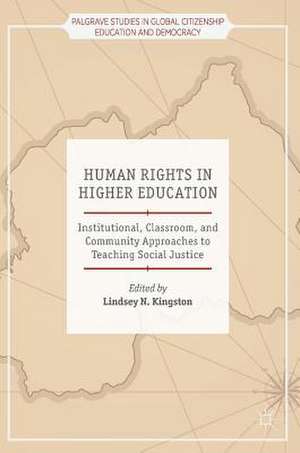Human Rights in Higher Education: Institutional, Classroom, and Community Approaches to Teaching Social Justice: Palgrave Studies in Global Citizenship Education and Democracy
Editat de Lindsey N. Kingstonen Limba Engleză Hardback – 20 aug 2018
| Toate formatele și edițiile | Preț | Express |
|---|---|---|
| Paperback (1) | 636.80 lei 6-8 săpt. | |
| Springer International Publishing – 22 dec 2018 | 636.80 lei 6-8 săpt. | |
| Hardback (1) | 891.80 lei 6-8 săpt. | |
| Springer International Publishing – 20 aug 2018 | 891.80 lei 6-8 săpt. |
Din seria Palgrave Studies in Global Citizenship Education and Democracy
- 20%
 Preț: 567.59 lei
Preț: 567.59 lei -
 Preț: 399.29 lei
Preț: 399.29 lei - 18%
 Preț: 727.00 lei
Preț: 727.00 lei - 18%
 Preț: 894.03 lei
Preț: 894.03 lei -
 Preț: 382.57 lei
Preț: 382.57 lei -
 Preț: 383.12 lei
Preț: 383.12 lei -
 Preț: 392.60 lei
Preț: 392.60 lei - 18%
 Preț: 890.54 lei
Preț: 890.54 lei - 18%
 Preț: 725.75 lei
Preț: 725.75 lei - 15%
 Preț: 698.15 lei
Preț: 698.15 lei - 15%
 Preț: 585.26 lei
Preț: 585.26 lei - 12%
 Preț: 416.54 lei
Preț: 416.54 lei - 18%
 Preț: 783.81 lei
Preț: 783.81 lei -
 Preț: 451.87 lei
Preț: 451.87 lei -
 Preț: 386.22 lei
Preț: 386.22 lei -
 Preț: 457.80 lei
Preț: 457.80 lei - 18%
 Preț: 723.38 lei
Preț: 723.38 lei - 15%
 Preț: 637.78 lei
Preț: 637.78 lei -
 Preț: 485.46 lei
Preț: 485.46 lei - 15%
 Preț: 693.39 lei
Preț: 693.39 lei -
 Preț: 387.75 lei
Preț: 387.75 lei - 15%
 Preț: 698.94 lei
Preț: 698.94 lei -
 Preț: 395.47 lei
Preț: 395.47 lei
Preț: 891.80 lei
Preț vechi: 1087.56 lei
-18% Nou
Puncte Express: 1338
Preț estimativ în valută:
170.64€ • 178.65$ • 141.20£
170.64€ • 178.65$ • 141.20£
Carte tipărită la comandă
Livrare economică 05-19 aprilie
Preluare comenzi: 021 569.72.76
Specificații
ISBN-13: 9783319914206
ISBN-10: 3319914200
Pagini: 208
Ilustrații: XVI, 247 p. 8 illus.
Dimensiuni: 148 x 210 mm
Greutate: 0.47 kg
Ediția:1st ed. 2018
Editura: Springer International Publishing
Colecția Palgrave Macmillan
Seria Palgrave Studies in Global Citizenship Education and Democracy
Locul publicării:Cham, Switzerland
ISBN-10: 3319914200
Pagini: 208
Ilustrații: XVI, 247 p. 8 illus.
Dimensiuni: 148 x 210 mm
Greutate: 0.47 kg
Ediția:1st ed. 2018
Editura: Springer International Publishing
Colecția Palgrave Macmillan
Seria Palgrave Studies in Global Citizenship Education and Democracy
Locul publicării:Cham, Switzerland
Cuprins
Chapter 1. “The Ideal of a Human Rights Campus”.- Chapter 2. “Social Justice Programs and Just Administrative Practices”.- Chapter 3. “Faculty-Student Collaborative Human Rights Research”.- Chapter 4. “Supporting Inclusive Campus Communities: A Student Development Perspective”.- Chapter 5. “Real-World Survivor: Simulating Poverty to Teach Human Rights and Sustainable Development”.- Chapter 6. “Context Alters Perception: The Importance of Travel in Human Rights Education”.- Chapter 7. “Creating a Trauma-Sensitive Environment for Teaching Human Rights”.- Chapter 8. “What Do You Think You’re Looking At? The Responsibility of the Gaze”.- Chapter 9. “Education as Resistance: Teaching Critical Criminology to (Aspiring) Cops”.- Chapter 10. “Human Rights Conferences and Facilitating Community Dialogue”.- Chapter 11. “Community-Based Social Justice Work: The WILLOW Project”.- Chapter 12. “The Bijlmer Project: Moving the Classroom into our Community to Combat Human Trafficking”.- Chapter 13. Conclusions.
Notă biografică
Lindsey N. Kingston is Associate Professor of International Human Rights at Webster University, USA. She directs Webster University's Institute for Human Rights and Humanitarian Studies and is a topical expert on the issues of statelessness and forced displacement.
Textul de pe ultima copertă
This book focuses on human rights education (HRE) in higher education, with an emphasis on supporting undergraduate education for social justice and global citizenship at the institutional, classroom, and community levels. Drawing from the work of human rights scholars and advocates at Webster University, Kingston begins a critical discussion about the potential of HRE on college campuses and beyond. Chapter contributors address the institutional issues inherent to building a “human rights campus,” promoting just governance models, facilitating student research, and fostering inclusive campus communities. They further explores opportunities within the classroom by highlighting dynamic courses on global sustainable development and post-genocide reconciliation in Rwanda, as well as considering how to create trauma sensitive learning spaces and utilize photography as a human rights teaching tool. Finally, scholar-advocates detail how HRE can be expanded to include the broader community—including teaching critical criminology to aspiring police officers, facilitating community dialogue through academic conferences, and engaging in social justice work related to access to justice, domestic violence, and human trafficking.
Caracteristici
Highlights the possibilities, challenges, and key questions central to building a human rights campus Proposes a shift from the traditional educational paradigm and explores the value of taking the classroom into the community to engage in social justice work Outlines best practices in education to teach students about fundamental rights to food, water, education, family, health, freedom of movement, and cultural participation
